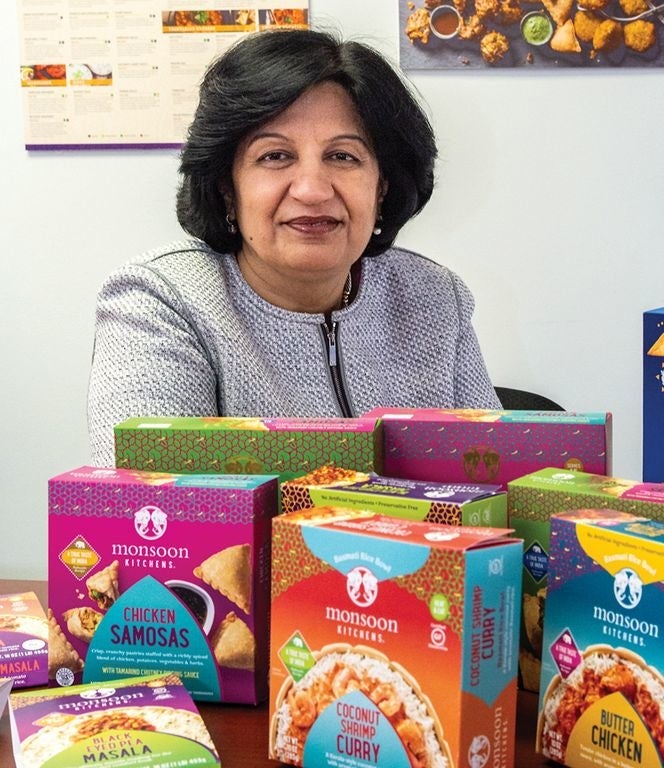This year could be big for Swati Elavia and Monsoon Kitchens as her company zeros in on a new sales record.
Based in Shrewsbury, the wholesale producer of mostly vegetarian Indian food expects to find its way into all major supermarket chains as it continues to find a home in thousands of college, hospital and corporate cafeterias.
Already this year, Elavia was named the Small Business Person of the Year for Massachusetts by the U.S. Small Business Administration.
“Given the trends taking place with demographics, I think she has a lot of potential,” said SBA Massachusetts District Director Robert Nelson, looking specifically at shifting consumer trends calling for the more vegetarian-friendly food.
Elavia, an India native who moved to the U.S. in 1982, completed the SBA’s inaugural Emerging Leaders Initiative in Worcester this year as Monsoon launched a new line of retail products. The company has samosas and other quick-bite appetizers – and even some full meals like chicken tikka masala – ready to hit the shelves of U.S. grocery stores.
Monsoon has products placed in 15 New York-area Fairway Market stores, finalizing that first order on April 10. The company is closing deals with much larger supermarkets, which Elavia didn’t want to name until the agreements are signed.
“Then we will go to everybody – the Whole Foods of the world and Stop & Shop,” she said.
With these agreements and its already steady contracts with cafeteria food providers, Monsoon could break the $5-million mark in sales this year.
“We are really hoping this year that we’ll hit it and come in at least 20% to 30% higher,” Elavia said.
A food specialist
Elavia’s career began in food, although in a much different capacity. In the 1990s, she was a nutrition specialist at cereal and branded food manufacturer General Mills in Minneapolis. In a role not at all consumer-facing, she was responsible for product labeling and staying up to date on nutrition research and food science to make sure products were healthy.
When her husband landed a finance job in Boston in 1999, the family, with three young daughters, moved to New England.
“That was a perfect time for me,” she said.
Most of the nutritionist jobs in the Boston area were in hospital settings, but Elavia opted instead to chart her own path. She first began experimenting and then selling spice blends under a different name, but she soon saw the demand for Indian appetizers.
In 2003, she found a local Indian restaurant in Cambridge, Masala Art, which partnered with her to produce her first-ever samosas. Thus Monsoon Kitchens was born. Its first account was international financial institution World Bank in Washington, D.C., which served her food in its cafeteria.
Star of the program
Monsoon kept growing until a production center in Somerville allowed Elavia to experiment and introduce more products, leading to the company finding a niche in college and university cafeterias.
“Everyone said college is where you should go,” Elavia recalls. “Students love trying new stuff.”
The company’s first college account was Harvard University in Cambridge, which has a diverse student population currently 42.4% white. That diversity helped increase the demand for Monsoon’s food. The company now partners with cafeteria food providers, which Elavia estimates offer her products in more than 10,000 college, hospital and corporate cafeterias.
Despite penetrating the niche market of college cafeteria food service, Elavia’s business lived on the edge for the first few years.
“Those first five years were not good,” she said, recalling the annual debate on whether or not her business was going to remain sustainable.
Production continued in Somerville until 2012 when it became clear Monsoon would not continue to grow unless a drastic change was made: either invest heavily into the Somerville site or outsource that production.
Ultimately, Monsoon’s home of seven years was left behind in favor of contracting out the product manufacturing operations to efficient co-packers in Pennsylvania, North Carolina and Maryland.
What previously took two days now takes a few hours thanks to heavily-automated machines.
“We improved our margins about 8% or 9% when we moved to a co-packer,” she said.
Since that move in 2012, Monsoon has grown about 400% as it nears $5 million in annual sales.
Nelson, from the SBA, said Monsoon is poised for explosive growth after Elavia completed the Emerging Leaders program. At the end of the program, the 19 participants pitched their three-year growth plan to an expert panel. Nelson was on the panel for Elavia’s pitch, which received the highest scores.
Her identity not only as a woman, but as a person of color, makes her success story even more impactful, Nelson said.
“She has tremendous opportunity for success when you look at the background and industry experience she has,” he said. “She was definitely one of the stars of the program.”
Hitting the market at the right time
Elavia is on the right track, as the market for vegetarian food – of which Indian dishes are largely made – grew by 20% over 2017 with U.S. sales topping $3.3 billion last year, according to a Nielsen study commissioned by the Plant Based Foods Association.
It’s a drastic change from 37 years ago after Elavia and her husband first moved to the U.S. and settled in North Carolina, when finding Indian food was tough, she said.
Elavia said the increase in the number of Indian immigrants has played a role in the rise of demand for Indian food. In 2015, there were just under 4 million Indian immigrants in the U.S., up more than 109% from 15 years prior, according to a 2017 report from Pew Research Center.
Monsoon’s products rarely ever penetrate Indian food markets because most of that food is imported and Elavia can’t compete on price. For now, she’s banking on the American consumer’s evolving opinions on vegetarian and ethnic foods, but she’s keeping the U.S. consumer’s eating habits in mind.
“I might do some Indian-style pizzas,” she quipped.

